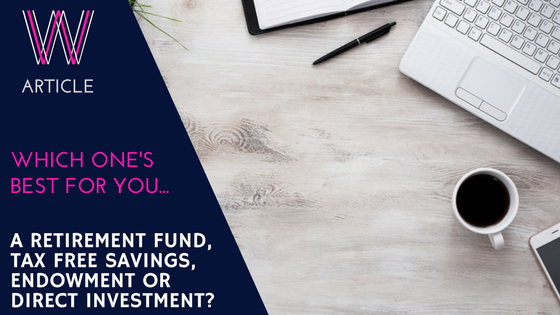Investing comes down to 3 things
- Be honest about your investment behaviour
- Choose the right fund (listen here)
- Choose the right tax structure – it can cost or save you a huge amount of money. This is where you choose between Retirement Funds, Tax Free Investments or savings, Endowments or direct investment
Too many choices!
In our first article on this topic, we discussed the differences between the four different investment vehicles. The main take away was that you could put the same unit trust (mutual fund) in all of them, but the tax treatment of them was different.
Now that you understand that, the question comes as to which is best for you?
Well, not knowing your personal circumstances, I can’t say. But let me give you the information so you can make a better choice.
The key differences
| Retirement Annuity | Tax Free Savings Account | Endowment | Discretionary investment or direct investment | |
| Purpose of investment | Retirement | Long term savings / retirement | Medium to Long term – Goal Based Savings | Any term or use |
| Time period | Long Term | 15 years or more | 5 years or more | Any time period |
| Income Tax | NO income tax – salary payments | After income tax | ||
| Amount | Max of R350,000 or 27.5% (whichever is lower) | R33,000 per year to a max of R500,000 ever invested | No limit, although products and technology platforms may have certain limits they impose | |
| Where you want to invest | Max 30% offshore + 10% in Africa | Freedom to choose | ||
| Currency | Rand (home currency) | Freedom to choose | ||
| Limits for high risk assets | 75% limit for shares, 25% for listed property | Freedom to choose | ||
| Tax efficient while investing | Yes, no CGT, no Interest Income Tax, no Dividend Tax | Yes, no CGT, no Interest Income Tax, no Dividend Tax | ONLY if you pay more than 30% tax | No |
| Tax on drawing money out | Yes, income tax rates (but first R500,000 is free) | No | Yes, Capital gains tax to a max of 18% | |
| Limit on the amount you can draw | Yes, between 2.5% minimum and 17.5% | No maximum or minimum | ||
| Tax on death | No, skips estate | Yes, included in estate tax @20% | No, skips estate | Yes, included in estate tax @20% |
| Insolvency protection | Yes | No | Yes | No |
Other things to bear in mind
The theory is always great. The challenge comes in the difference between theoretical behaviour and actual behaviour. And this is a field of study called behavioural economics. I love behavioural economics because in my wealth management business, I’ve seen so many times that theory and behaviour are very far apart.
So this is where being mindful about your money behaviour is hugely important.
- Retirement funds – if you are self employed, or adding extra money into your own private RA, then you need to be honest as to what’s happening to the tax money. If you’re using the retirement contributions to lower the tax paid, but not taking that amount that should have been paid to tax and putting it in an investment account, then rather put the money into the TFSA or a discretionary fund. If you don’t get the benefit of the money going into the investment tax free, then you’re going to pay tax twice on that investment – once when the money goes in, and again when the money goes out. And if you’re spending the money you get back in tax and not putting it into an investment account, then you’re going to pay tax twice.
- TFSA’s – if you’re going to think of it as money you can draw before you retire or a minimum of 15 years, then rather put that money into a discretionary account or endowment
- Endowments and Retirement funds – if you think you’re going to put your hand in the cookie jar of a TFSA or discretionary fund, then rather lock it up in an Endowment or RA. Even use a notice account – less interest is better than no savings at all. The barriers to exit make it a challenge.
- Paying tax – for many people, it’s better to pay tax now whilst you’re earning and it just squeezes out spending rather than in retirement.
So make sure you check all three boxes when choosing your investment
- Be honest about your investment behaviour
- Choose the right fund
- Choose the right tax structure

